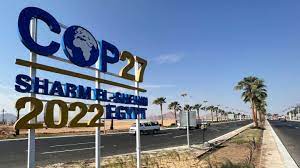The United Nations Climate Conference in Egypt finished last week with the presentation of a 12 page final report, “The Sharm el-Sheikh Implementation Plan” [1].
The aim of the conference for participating countries had been clear:
1. To agree on how to reduce man-made climate warming Green House Gases, biodiversity loss, deforestation and other environmental issues.
2. To agree on payments for damage to poorer nations by the increasingly destructive climate and for measures to adapt to it.
The report consists of 16 sections and 62 short paragraphs summarizing the decisions made at the conference.
Section XV covers Agriculture and welcomes “climate action on agriculture and food security”, but this is a high level document and there are no specific actions, and certainly none related to animal farming. However, if the Implementation Plan is taken seriously then countries will need to accelerate the take-up of plant-based diets as seen below.
Here’s a selection of relevant paragraphs, followed by my comments on the text
The Plan begins by “noting the importance of transition to sustainable lifestyles and sustainable patterns of consumption …”
VP: Few things are more unsustainable than meat production [4a]. Livestock farming contributes to 17% of man-made GHG. Clearly an area for change. if the average diet in the UK was shifted to a vegan diet, it would lead to a reduction in GHG emissions of 2.4 kg CO2e per person per day (a 28% reduction in diet related GHG emissions) [4b]
Para 5 (Science and Urgency). Recognizes the importance of the best available science for effective climate action and policymaking;
VP: The best available science advocates plant-based diets [5]
Para 12 (Energy). Emphasizes the urgent need for immediate, deep, rapid and sustained reductions in global greenhouse gas emissions by Parties across all applicable sectors
VP: In the Agricultural sector, livestock is a major source of Carbon Dioxide and Methane. Reducing the numbers is an obvious action to take.
Para 15 (Mitigation). Recognizes that limiting global warming to 1.5 °C requires rapid, deep and sustained reductions in global greenhouse gas emissions of 43 per cent by 2030 relative to the 2019 level
VP: If this target is to be achieved then significant reduction of livestock numbers must begin now.
Para 29 (Mitigation). Reiterates its invitation to Parties to consider further actions to reduce by 2030 noncarbon dioxide greenhouse gas emissions, including methane
VP: Livestock farming is a major source of man-made Methane emissions. [6]. And must be significantly reduced in order to meet this target
Para 30 (Mitigation). Emphasizes the importance of protecting, conserving and restoring nature and ecosystems …
VP: Livestock forming is the key driver of forest and marine environment destruction. If this target is going to be achieved, then the widespread take up of plant-based diets is essential. [7]
Para 43 (Adaptation). Emphasizes the importance of protecting, conserving and restoring water and water related ecosystems, including river basins, aquifers and lakes …
Para 79 (Ocean). Encourages Parties to consider, as appropriate, ocean-based action in their national climate goals…
VP: An appropriate action would be to ban destructive and unsustainable fishing [8a]. Even a cursory examination shows that this will include scallops [8b], tuna [8c] and salmon [8d] and Lobster [8e]. Acidification of the oceans is growing worse [9]. Advocating plant-based diets will be at the heart of any effective action.
Para 80 (Forest) … positive incentives for activities relating to reducing emissions from deforestation and forest degradation, and the role of conservation, sustainable management of forests and enhancement of forest carbon stocks in developing countries …
VP: Livestock farming is the primary cause of forest destruction and degredation. Again, Advocating, promoting, and incentivising plant-based diets will be at the heart of any effective action. [10]
The conference was also notable for its consumption of meat!
COP27 has once again drawn criticism from climate activists for the inclusion of unsustainable meat and dairy items on menus. Confirmed menu options include a $100 beef medallion dish, a $50 seafood platter starter, and a $40 salmon concoction. Salmon is not native to Egypt, meaning that it will likely have been flown in from the Atlantic, thousands of miles away. [11]
Other Impressions
But twelve months on from the COP26 conference in Glasgow [2], the progress has been mixed. A new fund to support the victims of climate disasters is welcome, but there was little to address the problem of GHG emissions. Carbon Brief have compiled a list of Key Outcomes [2a]
We’re basically one step further towards exceeding 1.5°C, says Kaveh Guilanpour, a former climate negotiator now at the US-based Center for Climate and Energy Solutions [3a]
This is the 27th -yes 27th! – COP and still NO detectable dent so far in the carbon curve, which carries on exactly as if we’d never noticed climate change. What more evidence do we need to prove that the COP process simply isn’t capable of delivering the change we need?, Mike Berners-Lee, 19th Nov [3b]
The fossil fuel lobby must be dancing for joy after managing yet again to keep fossil fuel reduction safely away from the outcomes of COP27, Mike Berners-Lee, 23rd Nov [3c]
As in last years COP26 report, no paragraphs begin with “Commits to”. Paragraph 8 “Resolves to pursue further efforts to limit the temperature increase to 1.5 °C”, but this of course guarantees nothing.
References
[1] https://unfccc.int/documents/624444
[2] https://veganpieces.org/climate/cop26-impressions
[2a] https://www.carbonbrief.org/cop27-key-outcomes-agreed-at-the-un-climate-talks-in-sharm-el-sheikh
[3a] https://www.newscientist.com/article/2348073-what-are-climate-summits-actually-for-and-how-can-we-make-them-work
[3b] https://twitter.com/MikeBernersLee/status/1594043722656002048
[3c] https://twitter.com/MikeBernersLee/status/1595336883101487106
[4a] https://www.monbiot.com/2017/10/06/the-meat-of-the-matter
[4b] https://www.researchgate.net/publication/254408569_The_relative_greenhouse_gas_impact_of_realistic_dietary_choices
[5] https://www.sciencedirect.com/science/article/abs/pii/S0048969715303697
[6] https://veganpieces.org/climate/methane-matters
[7] https://veganpieces.org/planetary-boundaries/planetary-boundaries-an-overview
[8a] https://veganpieces.org/biodiversity/seaspiracy-review
[8b] https://www.theguardian.com/environment/2021/mar/17/trawling-for-fish-releases-as-much-carbon-as-air-travel-report-finds-climate-crisis
[8c] https://www.thetimes.co.uk/article/sustainable-tuna-fishing-kills-endangered-silky-sharks-3h9x0gpkk
[8d] https://www.bbc.co.uk/news/uk-scotland-48266480
[8e] https://www.theguardian.com/environment/2022/sep/08/us-lobster-put-on-red-list-to-protect-endangered-north-atlantic-right-whales
[9] https://veganpieces.org/planetary-boundaries/ocean-acidification
[10] https://veganpieces.org/planetary-boundaries/land-use
[11] https://plantbasednews.org/news/environment/cop27-climate-crisis-conference-serving-meat
